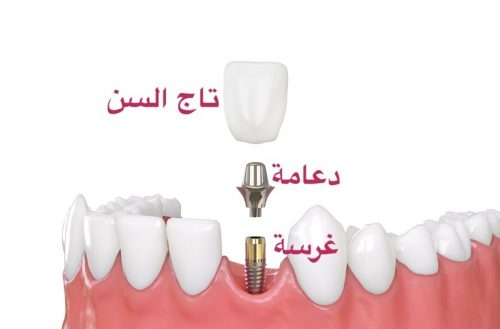A Dental Implants is a titanium rod that takes the shape of a cylindrical tooth root, and an abutment is installed over it to support a tooth crown, bridge, or even a complete dentuure. The abutment is made of titanium or zirconium. As for the crowns and bridges, they are made of porcelain, zirconium, or acrylic.
What are dental implants?

What are the steps of dental implants?
The most important step in the dental implant process is its first step in which the doctor places the implant inside the jaw bones in a position that allows for the perfect installation. The dentist can use modern technology and techniques for imaging the jawbones in 3D to determine the ideal position for the implant in terms of length, width and distances between the implant and the vital tissues in the mouth, after placing the implant in the patient’s mouth, we wait for a period ranging from 3 to 6 months until osseointegration of implant and jaw bone, and finally the treating doctor makes the prosthodontic according to the case.
What is the price of dental implants?
The prices of dental implants in the Arab countries range from 750 to 2000 dollars, and the price of zirconium crown ranges between 350 to 450 dollars, while the prices of dental implants in Egypt range between 350 and 700 dollars, including the crown, and the price varies according to the type of implant used and its guarantee, as the center provides a group of the best Types with a lifetime guarantee on implants and fixtures.
What are the disadvantages of dental implants?
Some people hate dental implants as they require a surgical procedure, despite the possibility of putting dental implant without opening the gums, but it remains a surgical procedure, and some also hate dental implants as it requires a long time that may extend to 6 months to ensure the fusion of the implant with the jawbones.
Is it possible to do an immediate implant?
With the development in digital imaging technology and biochemical technology, it has become possible to make immediate dental implants, where the implant specialist places the dental implants and completes the prosthodontic within a week as a maximum, but the immediate implants have some conditions related to the density and quality of the bone and the general health of the patient.
Do I need a bone graft?
The patient may need a bone graft to install dental implants in the event of jawbone regression or in case of sinus expansion, and often at an additional cost.
How is a full arch reconstruction performed?
It is possible to do a full arch of teeth by placing only 4 implants and installing a bridge consisting of 12 teeth, but the more implants the better in terms of continuity and ease of repair.
How do I know if I am suitable for dental implant?
It is necessary to visit a specialized dentist to do a three-dimensional x-ray to evaluate the condition of the jaw bones and assess the health status, but in general dental implants are not suitable for diabetic patients [if it is not controlled] and are not suitable for patients taking osteoporosis medications and in the case of radiotherapy.
Are there types of dental implants?
Of course, there are many Korean, American, German, and Swiss types, and the mentioned types differ in terms of screw design, manufacturing quality, and also titanium used.
A full range of dental implant services
- The center has the best types of dental implants: German, American and Swiss
- The center has 3D x-rays and panoramic x-rays
- Highest quality and best prices
- pain free and in the shortest possible time
- All implants have a written guarantee for life
- Specialized in full jaw implants and full dental rehabilitation
- The possibility of using the surgical guide to make implants without surgery for the gums
- The clinic has a complete dental implant unit equipped with the latest technology
- There are multiple alternatives to full jaw prostheses in terms of types of implants and types of fixtures
- Availability of All On Four implants for full jaw implants on 4 implants
Have any questions? Call us now!
Dental implant benefits
- Feeling the sensation of chewing food naturally in a large proportion
- Hardness and durability
- Possibility of immediate cultivation
- Restore the patient’s self-confidence
- The possibility of compensating a full jaw with fixed teeth instead of moving sets
- Without dental cold, which ensures a higher safety rate








